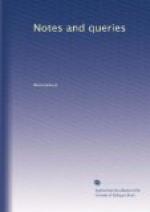I quote from recollection, so perhaps have omitted part, but believe it to be pretty correct. I heard it at the same time as the one quoted in No. 31., and believe both to be hoaxes, as no answer I have heard (including that given in No. 35.) can be considered satisfactory. The former charade was attributed at the time to the late Archbishop of Canterbury, and it was reported that a reward of 100l. was promised for the correct answer, and I know that a clergyman sent him an answer with that belief. Among the answers suggested was “Tapir,” taken in its various significations, which I think was as near the mark as “Church,” as given in No. 35.
I have never heard any answer suggested to Sir Hilary’s dissyllabic prayer.
B.H.C.
Discursus Modestus (Vol. i., pp. 142. 205.).—Such of your readers as have been making inquiries and suggestions respecting Discursus Modestus will {159} be glad to hear that a copy exists in the British Museum. Its title is as follows:
“A Sparing Discoverie of ovr English Iesuits, and of Fa. Parson’s proceedings vnder pretence of promoting the Catholick Faith in England: for a caueat to all true Catholicks, ovr very louing brethren and friends, how they embrace such very uncatholike, though Iesuiticall deseignments. Eccles. 4. Vidi calumnias quae sub sole geruntur, et lachrymas innocentium, et neminem consolatorem.—Newly imprinted, 1601.”
At the end of the Preface are the initials W.W., making it clear that Watson, the author of Important Considerations and the Quodlibets, was the writer, and accounting for the connection which seemed to exist between the Discursus and the Quodlibets.
The two passages quoted by Bishop Andrewes (Resp. ad Apol. pp. 7. 117.) are to be found in p. 13. But the question now arises, from what earlier book the quotations are taken, as they both appear in the Sparing Discovery in Latin, and not in English? Did the Jesuits publish a work containing such statements? or are we to accept them as their opinions only on the authority of so bitter an opponent as Watson?
James Bliss.
“Rapido contrarius orbi” (Vol. ii., p. 120.) is in one of the finest passages in Ovid:
“Nitor in adversum nec me qui caetera
vincit
Impetus, et rapido contrarius evehor orbi.”
C.B.
"Isabel” and “Elizabeth."—At pages 439. and 488. of Vol. i., “Notes and Queries,” are questions and answers on the names of “Isabel” and “Elizabeth.”
The following, from the Epigrammaton Joannis Dunbari, Lond. 1616, may amuse some of your readers:
“AD. FREDERICUM PRINCIPEM PALATIN. RH.
“Selectam Elector sibi quando elegit
Elisam:
Vere Electoris nomine dignus erat.”
“AD ELISHABETHAM EIUS SPONSAM.
“El Deus est, ish vir, requiem Beth
denique donat:
Hine merito Elisabeth nobile nomen habet.
Scilicet illa Deo est motore, et Principe
primo,
Principis una sui lausque, quiesque viri.”




